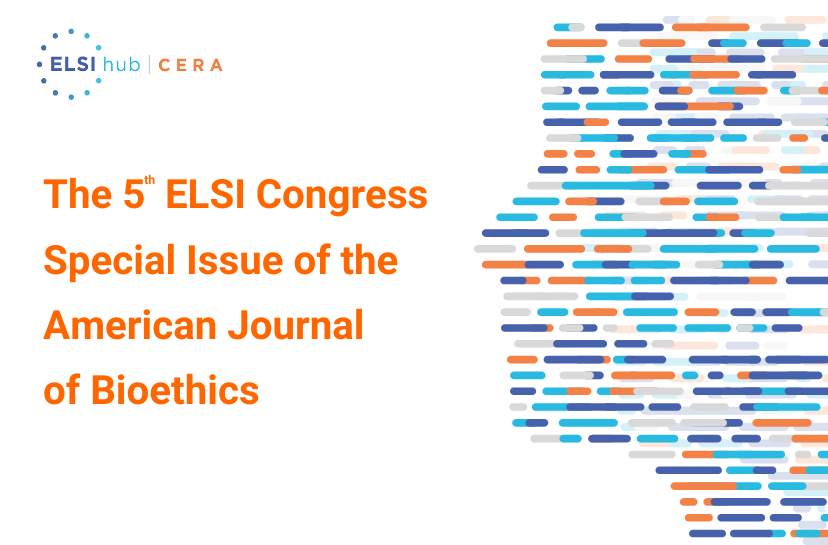
Announcing the 5th ELSI Congress Special Issue of the American Journal of Bioethics
We are pleased to announce the publication of a special issue of the American Journal of Bioethics.
The 5th ELSI Congress issue includes five target articles, thirty-one open peer commentaries, and two guest editorials focused on equity and inclusion of diverse publics in genomic and precision medicine research. Target articles in the issue represent work presented at the 5th ELSI Congress: Innovating for a Just and Equitable Future held May 31 - June 3, 2022, a biennial conference supported by the National Human Genome Research Institute (NHGRI) at the National Institutes of Health (NIH) and organized by the ELSI Congress 2022 Organizing Committee.1 The committee selected the theme of advancing equity and justice in the context of ELSI research and solicited a call for presentations that resulted in a congress attended by approximately 600 participants.
After the congress, CERA issued a separate call for papers devoted to the congress theme for this special issue and solicited all conference presenters to submit a proposal for an article. Proposals were selected by a guest editorial board2 that included expertise and experience in bioethics, public health genetics, anthropology, law, philosophy, and health policy. The final papers were chosen for their capacity to catalyze questions about equity and justice in their engagement with public policy, participatory democracy, advocacy, and access to genomic and precision medicine.
Authors in the issue reflect multi-disciplinary, multi-institutional collaborations inside and outside of the U.S. They address a range of ELSI research that surfaces critical questions about equity for the future of genomics and precision medicine. From their vantage points in the varied sites of these research enterprises, the authors argue for the need to assess carefully what, who, and how patients, research participants, families, communities, and nation-states may benefit and the importance of addressing competing individual and collective interests in defining public good. In addition, several of these articles raise the question of what meaningful engagement with communities looks like or should be.
Guest Editorials:
- Dolan, D. D., Cho, M. K., & Lee, S. S.-J. Innovating for a just and equitable future in genomic and precision medicine research. [Preprint available at SocArXiv Papers]
- Hull, S. C., Brody, L. C., & Sterling, R. Getting it right: How public engagement might (and might not) help us determine what is equitable in genomics and precision medicine.
Target Articles:
- Conley, J. M., Cadigan, R. J., Davis, A. M., Juengst, E. T., Kuczynski, K., Major, R., Stancil, H., Villa-Palomino, J., Waltz, M., & Henderson, G. E. The promise and reality of public engagement in the governance of human genome editing research.
- Halley, M. C., Halverson, C. M. E., Tabor, H. K., & Goldenberg, A. J. Rare disease, advocacy, and justice: Intersecting disparities in research and clinical care.
- Ferryman, K. Bounded justice, inclusion, and the hyper/invisibility of race in precision medicine.
- Dive, L., Holmes, I., & Newson, A. J. Is it just for a screening program to give people all the information they want?
- Shozi, B., & Thaldar, D. Promoting equality in the governance of heritable human genome editing through Ubuntu: Reflecting on a South African public engagement study.
Open Peer Commentaries:
- Cwik, B. Whose genome? Which genetics?
- Furrer, R., Barlevy, D., Pereira, S., & Lázaro-Muñoz, G. Curiosity and uncertainty resolution: Inflating the perceived utility of genetic information.
- Allyse, M. A., Meagher, K. M., Michie, M., Isasi, R., Ormond, K. E., Bonhomme, N., Bombard, Y., Howard, H., Musunuru, K., Riggan, K. A., & Rubeck, S. Translational justice in human gene editing: Bringing end user engagement and policy together.
- Milne, R., Aidid, U., Atutornu, J., Bircan, T., Boraschi, D., Costa, A., Henriques, S., Patch, C., & Middleton, A. What difference can public engagement in genome editing make, and for whom?
- Nicol, D., Dryzek, J. S., Niemeyer, S., Curato, N., & Paxton, R. The Australian Citizens’ Jury and Global Citizens’ Assembly on genome editing.
- Kamenova, K. The intrinsic value of public deliberation in the governance of human genome editing.
- Fox, B., & Martschenko, D. O. Rethinking the “public” and rethinking “engagement”.
- Rhodes, R., & Ostertag, G. Public engagement in shaping bioethics policy: Reasons for skepticism.
- Müller, R., Clare, A., & Ruess, A. K. STS and bioethics: Forging new synergies for exploring the potentials and pitfalls of public engagement with new biotechnologies.
- Scheinerman, N. Deliberative mini-publics and equity: Procedural benefits and promising outcomes for gene editing.
- Gregg, B. Imperfect methods for imperfect democracies: Increasing public participation in gene editing debates.
- Johnston, J. When less is more: Lessons for expanded carrier screening from newborn sequencing research.
- Strenk, M. E., Berrios, C., & Garrett, J. R. Addressing the burdens that newborn screening imposes on underserved communities.
- McCoy, M. S. Who is responsible for promoting equity in rare disease research?
- Gerido, L. H. Reliance on advocacy is the symptom, not the disease.
- Agans, G. Rare disease, advocacy, and caregiver burnout.
- Bonkowski, E., & Smith, H. S. The other side of the self-advocacy coin: How for-profit companies can divert the path to justice in rare disease.
- Mendizabal, A., & Jones, N. L. Ethical considerations in clinical trials for rare genetic diseases: The case of Huntington’s disease.
- Neeman, A. Critiquing the critique of advocacy.
- Braun, M., Bleher, H., Hille, E. M., & Krutzinna, J. Tackling structural injustices: On the entanglement of visibility and justice in emerging technologies.
- Adsit-Morris, C., NaDejda Collins, R., Goering, S., Karabin, J., Lee, S. S.-J., & Reardon, J. Unbounding ELSI: The ongoing work of centering equity and justice.
- Fletcher, F. E. Ethical, legal, and social implications of genomics research: Implications for building a more racially diverse bioethics workforce.
- Afolabi, M. O. S., & Sodeke, S. Social inequality and human genome editing: A nuanced analysis of the Ubuntuan ethical prism.
- Nyamnjoh, A.-N., & Ewuoso, C. What constitutes ethical engagement with Africa and the Global South?
- Creary, M. S. Racism and the textures of visibility.
- Silva Gallardo, C. P., & González Zarzar, T. The dialectics of racial invisibility and hyper-visibility under the mestizaje discourse in Latin America.
- Sturm, G., & Zoldan, Y. Reconfiguring health: The importance of recognizing embodied subjectivity and social dynamics in health.
- Nong, P., & El-Azab, S. Hypervisibility, surveillance, and bounded justice through data-driven health equity efforts.
- Garland-Thomson, R., & Larson, S. A. Narrative equity in genomic screening at the population level.
- Laberge, A.-M. From community-based carrier programs to opportunistic carrier screening: How the objective of carrier screening was lost in translation.
- Accoe, D. Disclosing reproductive genetic carrier status: What about the donor?
1The ELSI Congress was co-directed by Sandra Soo-Jin Lee and Mildred Cho, who convened an organizing committee that included Dounya Alami-Nassif (Columbia University), Paul Appelbaum (Columbia University), Jessica Blanchard (University of Oklahoma), Joy Boyer (NHGRI), Larry Brody (NHGRI), Shawneequa Callier (George Washington University), Mildred Cho (Stanford University), Deanne Dunbar Dolan (Stanford University), Gail Henderson (University of North Carolina), Steven Joffe (University of Pennsylvania), Angelica Johnson (Columbia University), Dave Kaufman (NHGRI), Gabriel Lázaro-Muñoz (Harvard Medical School), Sandra Soo-Jin Lee (Columbia University), Nicole Lockhart (NHGRI), Caroline Moore (Stanford University), Osagie Obasogie (UC Berkeley), Lisa Parker (University of Pittsburgh), Kayte Spector-Bagdady (University of Michigan), Rene Sterling (NHGRI), James Tabery (University of Utah), Wendy Uhlmann (University of Michigan), Emily Van Poetsch (Stanford University), Joe Vitti (Broad/Harvard/MIT), Alexis Walker (Columbia University), Joon-Ho Yu (University of Washington), and Rachel Yarmolinsky (Columbia University).
2The guest editorial board for this issue included: Jessica Blanchard, Shawneequa Callier, Mildred Cho, Deanne Dunbar Dolan, Gabriel Lázaro-Muñoz, Sandra Soo-Jin Lee, David Magnus, Kayte Spector-Bagdady, James Tabery, and Joon-Ho Yu.


